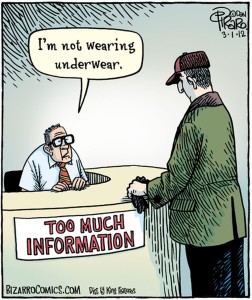The study strengthens the sense derived from previous research that, no, we won’t tell you, because you can’t then un-know it.
 Beer Sheva, March 9 – A comprehensive review of available data has concluded that under the circumstances, it would be better that you not know.
Beer Sheva, March 9 – A comprehensive review of available data has concluded that under the circumstances, it would be better that you not know.
Scientists from Ben-Gurion University analyzing the information in conjunction with the Ministry of the Interior surveyed the results of the inquiry and determined that don’t even go there. They further stated that continued pursuit of the inquiries would result in an undesirable state of Too Much Information. The researchers would have published their results in a scientific journal, but it’s none of your goddamn business, come to think of it, and please stop asking.
The team of researchers came to the conclusion based on a thorough, reluctant second look at the data, which all pointed to the fact that they could tell you, but then they would have to kill you. In fact, they insisted, the most convincing interpretation of the data is, well, frankly, they would rather not talk about it.
“It’s basically unequivocal, and I’m not entirely certain how we missed it in earlier studies,” said lead author Sy Lentz. “I could say more, but, well, I think everyone’s better off if I don’t.” He added that he’d already said too much, and that he was sorry he even mentioned it.
Other experts confirmed the analysis. “Really, discretion is the better part of valor here,” said Ignatz Izbliss, who was not involved in the study, and is grateful for that fact. “Please, change the subject. Can we discuss something else? Here, I have this video clip of a cyst being popped…”
The study strengthens the sense derived from previous research that, no, we can’t tell you, because you can’t then un-know it. Those studies, in turn, grew out of data pointing to the notion that we’re going to pretend you didn’t ask that. The original research, back when people could not be expected to know better, but really they should have, examined the question of trust us, you really don’t want to know.
Initially, said Lentz with noticeable discomfort, two different schools of thought existed on the subject, with the mainstream model of interpretation contending Don’t Go There. A smaller but vocal group of researchers insisted on an approach of Don’t Even Go There, Girl. Debate between the camps seldom took place, owing to circumstances that are better left unmentioned.
“Are we still talking about this? I can’t believe we’re still talking about this,” added Lentz.
Please support our work through Patreon.




